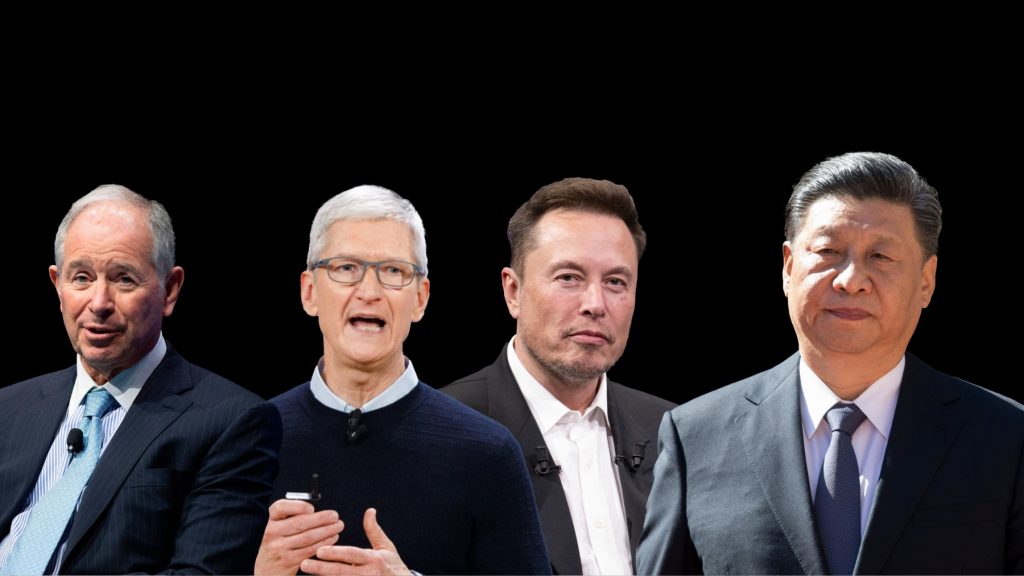
On November 15, Chinese President Xi Jinping dined with the US’ most influential tech CEOs, raising questions about the future of US-China technology and trade. So, what was Xi’s tech meeting about?
The guest list read like a who’s who of American technology and finance. There was Apple’s Tim Cook, Tesla’s Elon Musk, and Blackstone’s Steve Schwarzman among the bright minds sharing the table with President Xi.
This high-profile assembly, following a summit between Presidents Xi and Biden, underlined the intertwined fate of the US and China in global commerce, with a trade volume nearing $760 billion last year.
If we take a closer look, you’ll notice the seating arrangement wasn’t just a seating arrangement. Where each tech leader sat spoke volumes about the intentions and underlying messages of the event. If we look at Tim Cook, next to Chinese Minister of Commerce Wang Wentao, this can only be seen as a gesture highlighting the potential tech-trade collaborations. In parallel, Elon Musk’s brief appearance at the VIP reception, sans dinner, might be an indication of the complex, and sometimes cautious, rare interaction between US tech giants and the Chinese party’s political leadership.
Diplomatic Change in the Air
US Commerce Secretary Gina Raimondo emphasized the untapped potential in the US-China economic relationship, reflecting a keen
interest from the Americans and the Chinese to explore business opportunities despite tensions.
President Xi, in his keynote address, took the narrative towards building a partnership/partnerships instead of feeding rivalry. His question, “Are we adversaries or partners?” set the tone for his vision of a collaborative approach.
Yet, by now, we should know better than believe the word of a leader. Be it political or technological. While this meeting symbolizes a potential thaw in Sino-American relations, we should also have some questions. You know, between me, myself, and I.
So, it is reconciliation or just strategic posturing?
Is this gathering an image of a new cooperation, or is it a calculated move by Beijing to dodge the impact of further international sanctions and establish its resilience and independence on the global stage?
No? Fair enough. Is it a tech collaboration or political game?
For the tech giants’ Chiefs, this meeting could be very opportunistically lucrative for business in China. But then again, it also places them at the crossroads of complex political dynamics of technology transfer and intellectual property rights.
Which is… at the base of technology?
It’s all about the tech. Always was, always will be.
To fully understand the real value of the tech landscape, which was at the heart of Xi’s dinner, we must at least acknowledge that innovation is what’s driving the field.
Consider Beijing. To satisfy its needs, China understands the need, and value, of reciprocal exchange. Take, for example, its insatiable hunger for advanced semiconductor technology and its plans to push this sector forward, alongside other key areas like artificial intelligence and green energy. But, to truly appreciate the depth of China’s strategy we have to look at the evidence of its technological progress and developments of the past five years and anticipate those of the next five.
China is aggressively pursuing self-reliance in its tech sector, generally, and in three sectors, specifically. Why? Easy, to dodge US export controls that have crippled their tech giants, with the most prominent one being Huawei.
In parallel, there’s the US tech scene, marginalized by Silicon Valley. This hub is known for its innovation in both software and hardware, driven by a desire to tap into China’s vast consumer market and its manufacturing prowess.
Yet, this mutual dependence is not merely about reliance. It’s more of a battleground of competition. And at the center of this struggle are the tech industry’s CEOs. Tim Cook, Elon Musk, Steve Schwarzman of Blackstone, Marc Benioff of Salesforce, Stan Deal of Boeing, Raj Subramaniam of FedEx, Albert Bourla of Pfizer, Larry Fink of Blackrock, Merit Janow of Mastercard, Cristiano Amon of Qualcomm, among others.
This is not just a list. It’s a roll call of influential Chiefs. It’s a high-stakes game, and all the leaders are more than players.
No convinced? Is it a diplomatic balancing act?
Let’s talk US
The Biden administration’s participation, represented by high-ranking officials, adds even another layer of diplomatic degree. It showcases Washington’s willingness to engage with Beijing, yet the strategic vagueness remains, leaving room for various interpretations.
It is clear that the path ahead is not binary. That we can be certain of. It’s not merely a story of reconciliation or strategic defiance, but rather a polarized narrative where economic interests, technological advancements, and geopolitical strategies unfold.
President Xi’s dinner with the tech CEO is an event that will not offer a clear-cut resolution to the American-Chinese dynamic but opens not one, but multiple windows into the complex and evolving relationship between two global powerhouses.
Someone should tell them that the world is watching. Very closely.
Inside Telecom provides you with an extensive list of content covering all aspects of the tech industry. Keep an eye on our Tech sections to stay informed and up-to-date with our daily articles.